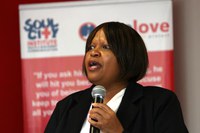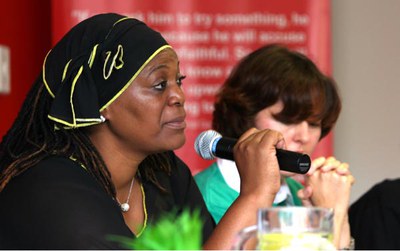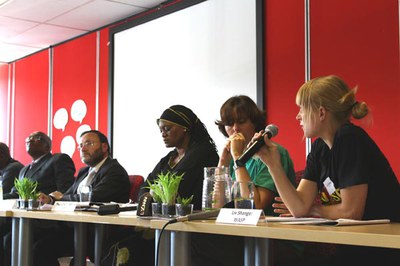
Putting Health on the Elections’ Agenda

Moderated by Wits University Professor Alex van den Heever, participants included Agang’s Dr Mia Hugo, COPE’s Papi Kganare, the DA’s Jack Bloom, IFP’s Millicent Sibisi, and WASP’s Liv Shange.
They tackled a range of issues such as standards of nursing care, private health care, the training of doctors, access to and cost of medicines, health information systems, health care management (including tenders and use of consultants), patent laws and accountability as well as measurements of health progress.
The debate, attended by health workers, NGOs, activists and the media, was held to raise questions around health policy and health service delivery in support of . oul City’s foverall campaing to to promote citizen engagement in health care provision.
COPE’s Kganare kicked off the debate by pledging that his party would have a “long-term human resource strategy to deal with issues of shortages”.
 Dr Motsoaledi said the ANC had identified a need to increase life h expectancy, decrease mother and child mortality, deal with AIDs, TB and Malaria as well as improve efficiency and effectiveness in the health care system. The National Health Insurance (NHI) was still a flagship initiative to solve structural problems and equalise access between the rich and poor.
Dr Motsoaledi said the ANC had identified a need to increase life h expectancy, decrease mother and child mortality, deal with AIDs, TB and Malaria as well as improve efficiency and effectiveness in the health care system. The National Health Insurance (NHI) was still a flagship initiative to solve structural problems and equalise access between the rich and poor.
The minister warned that the private sector was not a panacea for all South Africa's health problems: "if you subject our health care to profit and profit margins, it will collapse. We must put health first."
The DA urged practical measures such as the dropping of VAT on medicines to help lower costs. Bloom noted that South African had “not overhauled our patent laws for ages”. He called for better enforcement of the policies and regulations which were already in place.
AGANG’s Dr Hugo said training alone would not solve the current issues noted around nurses’ attitudes to patients: “This is not just training. Its systemic problems in the health sector including a lack of ownership in the sector. Nurses should be treated with dignity - the issue is far greater than just putting nurses in training.”
This view was shared by WASP’s Shange who added: “Patients need to fight for democratic control over the health care system. We advocate for a single health care system for all.”
Members of the audience thanked the Soul City Institute for organising the debate.
 “A major part of accountability lies in having discussions like this to hold everyone to account on the positions they take,” said facilitator Professor Van den Heever.
“A major part of accountability lies in having discussions like this to hold everyone to account on the positions they take,” said facilitator Professor Van den Heever.
“It is not enough for political parties to say health is important without also explaining to us exactly how this is reflected in their policies and programmes of action. We urge South Africans to use all election platforms as opportunities to engage political parties on health policies and the link between the policies and planned implementation,” said Soul City senior advocacy manager Savera Kalideen.
“Health policies are not merely pieces of paper- they are a critical tool to ensure that government is held to account and they drive delivery at every level,” Kalideen added.
